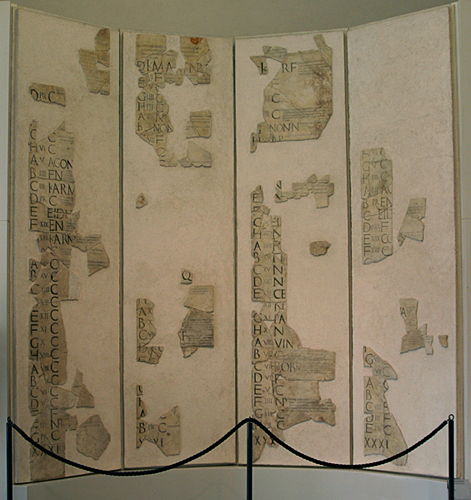
"His statue stands at Praeneste [Palestrina] in the upper part of the forum near the hemicycle, on which he exhibited the calendar which he had arranged and inscribed upon its marble walls."
Suetonius, On Grammarians (XVII)
The Fasti Praenestini is named after the town just east of Rome, where the calendar had been set up in the forum. Inscribed on marble and annotated by the grammarian Verrius Flaccus, who after Marcus Terentius Varro was "the most learned of all Romans" (Quintilian, Institutio Oratoria, X.1.95), it probably was dedicated to Augustus, possibly in celebration of his calendar reform, which took effect in AD 8. A number of fragments survive, allowing a partial reconstruction of the months of January, March, April, and December.
Suetonius relates that Verrius Flaccus, a freedman, would stimulate the efforts of his pupils by having those of similar ability compete against one another, setting them a subject on which to write and awarding the winner with a beautiful or rare book (On Grammarians, XVII). Chosen by Augustus to tutor his grandsons Gaius and Lucius, he moved into the palace and, with the understanding that he would accept no more pupils, was paid a hundred thousand sesterces a year.
(In AD 8, too, Ovid was banished from Rome, his work on the Fasti complete only for the first six months of the year. Each date provided the poet an opportunity to celebrate the legends and history of Rome, its festivals and sacred rites, and to evoke elements of the past and link them to the present.)
Varro had been assigned by Julius Caesar "to open to the public the greatest possible libraries of Greek and Latin books...[with] the charge of procuring and classifying them (Suetonius, XLIV), a project that did not come to fruition because of Caesar's assassination. Proscribed by Antony (Appian, Civil Wars, IV.47), who confiscated his villa and plundered his library (Gellius, Attic Nights, III.10.17), Varro was pardoned by Augustus and lived in seclusion, reading and writing until his death in 27 BC. It was a lost treatise by Varro, Antiquitates Rerum Humanarum et Divinarum ("Antiquities of Things Human and Divine," 47 BC) upon which Verrius based his own work De Verborum Significatu ("On the Meaning of Words"). This, too, has been lost but served as the source for the text by Sextus Pompeius Festus. The first half of this work has been lost as well, the latter half preserved in a single charred manuscript and a late eighth-century abridgement by Paul the Deacon, which was dedicated to Charlemagne for his library.
The surviving fragments of the Fasti Praenestini were discovered in the eighteenth century and acquired by the bishop of Palestrina, who displayed them in his family home in Rome until 1902, when they were transferred to the Museo Nazionale Romano. They now are in the Palazzo Massimo alle Terme.
Reference: Suetonius: Grammarians and Rhetoricians (1914) translated by J. C. Rolfe (Loeb Classical Library).